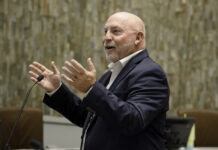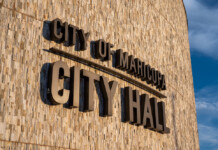
During his first State of the City address Thursday evening, Mayor Christian Price outlined his vision of a Maricopa that could be.
It’s what Price called “Act II.”
“One of the things that I like to tell people is that when you look at a multiple-act play in a theater, there’s an age-old saying that says ‘the second act is always the best,’” he said before city staff and community members inside the new city hall’s council chambers. “It allows for one to delve deeply into the meat of the story.”
Using a PowerPoint slide to guide guests through his speech, Price outlined the city’s history during the past 10 years as well as presented current challenges and future plans. He offered his own take on the Maricopa of tomorrow – something that goes beyond a city resident’s wishes for an IHOP restaurant or a Target.
“There is so much more to an economically viable city,” he said. “We must be able to dream big while simultaneously working toward measurable stepping stones to progress, putting in place the ideas, the goals and essentially the crucial building blocks to make these dreams the right reality.”
It begins by getting creative – by looking at the city’s assets, Price said. The asset that sticks out the most is land.
“We have a seemingly unlimited amount of land and open space,” he said. “We have huge amounts of room to grow. So what are we going to do to fill it? What are we going to put there?”
Price’s ideas included pursuing more institutions of higher education such as an engineering school as well as attracting tech companies and energy businesses.
The mayor pointed to the city of Mesa as an example of a municipality that has become a boomtown for higher education with schools such as Albright College and Benedictine University. The schools provide Mesa a talented workforce and jobs that otherwise would not be there, he said.
The mayor added that Maricopa might want to attract an engineering school because research shows that a high number of engineers will be retiring from the industry in the course of the next decade.
“These jobs pay on average over $100,000 a year,” he said. “They bring in resources. They bring in technology. Why are we not going after them and attracting them?”
Price also explained Maricopa is in a prime position to provide the needed space for the growing tech corridor in Chandler. He said as Chandler maxes out on the space within its borders, Maricopa seems to be the most logical area for these companies to take root.
“We stand to profit,” he said.
The energy sector could be another area city officials need to pursue, Price suggested. He put an emphasis on the possibility of solar and natural gas businesses.


![In mayoral race, it’s the Nancy Smith show Maricopa Chamber of Commerce Executive Director Kelly Anderson grills incumbent Mayor Nancy Smith in election's first campaign event April 30, 2024, at Southern Dunes Golf Club. [Elias Weiss]](https://www.inmaricopa.com/wp-content/uploads/2024/04/CRM_1009-218x150.jpg)
![City gave new manager big low-interest home loan City Manager Ben Bitter speaks during a Chamber of Commerce event at Global Water Resources on April 11, 2024. Bitter discussed the current state of economic development in Maricopa, as well as hinting at lowering property tax rates again. [Monica D. Spencer]](https://www.inmaricopa.com/wp-content/uploads/2024/04/spencer-041124-ben-bitter-chamber-property-taxes-web-218x150.jpg)
![3 things to know about the new city budget Vice Mayor Amber Liermann and Councilmember Eric Goettl review parts of the city's 2024 operational budget with Mayor Nancy Smith on April 24, 2024. [Monica D. Spencer]](https://www.inmaricopa.com/wp-content/uploads/2024/04/spencer-042424-preliminary-budget-meeting-web-218x150.jpg)




![Elena Trails releases home renderings An image of one of 56 elevation renderings submitted to Maricopa's planning department for the Elena Trails subdivison. The developer plans to construct 14 different floor plans, with four elevation styles per plan. [City of Maricopa]](https://www.inmaricopa.com/wp-content/uploads/2024/04/city-041724-elena-trails-rendering-218x150.jpg)






